- Home
- David Gemmell
The Legend of the Deathwalker Page 6
The Legend of the Deathwalker Read online
Page 6
“It might not be so simple, lord. The man was engaged in a fracas recently and thrashed several robbers. It may be necessary to kill him.”
“Then kill him. There are far more important matters needing my attention, Oreth. I have little time for consideration of such tiny problems.” Lifting his quill, Garen-Tsen dipped it into an inkwell and began once more to write.
Oreth bowed and backed away.
Garen-Tsen continued to work for almost a full hour. The words of the senator, however, continued to echo through his mind. “And one day you will be dragged screaming to this very room.” Such an event was at present extremely likely. As of this moment Garen-Tsen was perched on the very top of the mountain. The hold, however, was precarious, for his position of eminence depended entirely on a madman. Laying aside his quill, he contemplated the future. So far, mainly through his own efforts, both rival factions remained in balance. Such harmony could not be maintained for much longer, not with the king’s illness proceeding at such a terrifying rate. Soon his insanity would become too difficult to control, and a bloodbath would surely follow. Garen-Tsen sighed.
“On top of the mountain,” he said aloud. “It is not a mountain at all but a volcano waiting to erupt.”
At that moment, the door opened and a middle-aged soldier stepped inside. He was powerfully built and wore the long, black cloak of the Royal Guards. Garen-Tsen’s odd-colored eyes focused on the man. “Welcome, Lord Gargan. How may I be of service?”
The newcomer moved to a chair and sat down heavily. Removing his ornate helm of bronze and silver, he laid it on the desktop. “The madman has killed his wife,” he said.
Two Royal Guards led Chorin-Tsu into the grounds of the palace. Two more came behind, carrying the trunk in which lay the objects and materials necessary to the trade of the embalmer. The old man’s breath was wheezing from him as he hurried to keep up. He asked no questions.
The guardsmen led him through the servants’ halls and up a richly carpeted stairway into the warren of royal apartments. Skirting the fabled Hall of Concubines, the guards entered the royal chapel, bowing before the golden image of the God-King. Once through the rear of the chapel, they slowed, as if to make less noise, and Chorin-Tsu took the opportunity to regain his breath. At last they came to a double-doored private chamber. Two men were waiting outside. One was a soldier with a forked beard the color of iron; the second was the purple-garbed first minister, Garen-Tsen. He was tall and wand-thin, and his face bore no expression.
Chorin-Tsu bowed to his countryman. “May the lords of high heaven grant you blessings,” said Chorin-Tsu, speaking in Chiatze.
“It is unseemly and discourteous to use a foreign language in the royal chambers,” admonished Garen-Tsen in the southern tongue. Chorin-Tsu bowed once more. Garen-Tsen’s long fingers tapped at the second knuckle of his right hand. Then he folded his arms, his index finger touching his bicep. Chorin-Tsu read the sign language: Do what is required and you will live!
“My apologies, lord,” said Chorin-Tsu. “Forgive your humble servant.” Bringing his hands together, he bowed even lower than before, touching his thumbs to his chin.
“Your skills are needed here, Master Embalmer. No one else will enter this room until you have completed your … craft. You understand?”
“Of course, lord.” The guardsmen placed Chorin-Tsu’s trunk by the door. Garen-Tsen opened the door just wide enough for the elderly Chiatze to enter, dragging the trunk behind him.
Chorin-Tsu heard the door close behind him, then gazed around the apartments. The rugs were of the finest Chiatze silk, as were the hangings around the royal bed. The bed itself had been exquisitely carved and then gilded. Every item in the room spoke of riches and the extremes of wealth only monarchs could afford.
Even the corpse …
She was hanging by her arms from golden chains attached to rings in the ceiling above the bed, and blood had drenched the sheets below her. Chorin-Tsu had seen the queen only twice before: once during the parade at her wedding and then, two weeks ago, when the Fellowship Games began. In her new role as Bokat, goddess of wisdom, she had blessed the opening ceremony. Chorin-Tsu had seen her closely then. Her eyes had seemed vacant, and she had slurred the words of the blessing. Now he moved to a chair and sat, staring at the still body.
The old man sighed. Just as at the games ceremony, the queen was wearing the Helm of Bokat, a golden headpiece with flaring wings and long cheek guards. Chorin-Tsu was not well versed in Gothir myths, but he knew enough. Bokat was the wife of Missael, the god of war. Their son, Caales, future lord of battle, sprang fully grown from his mother’s belly.
But that was not the myth that inspired this insanity. No. Bokat had been captured by the enemy. The gods of the Gothir had gone to war, the world burning from the flame arrows of Missael. Bokat had been taken by one of the other gods and hung from chains outside the Magical City. Her husband, Missael, was warned that if he attacked, she would be the first slain. He had taken his bow and shot her through the heart; then he and his companions had rushed forward, scaling the walls and slaying all within. When the battle was over, he drew the arrow from his wife’s breast and kissed the wound. It healed instantly, and she awoke and took him in her arms.
Here in this room someone had tried to duplicate the myth. The blood-covered arrow was lying on the floor. Wearily Chorin-Tsu climbed to the bed, loosening the bolts that held the golden chains to the slender wrists of the dead queen. The body fell to the bed, the helm rolling clear and striking the floor with a dull clang. The queen’s blond hair fell free, and Chorin-Tsu noticed that the roots were a dull, mousy brown.
Garen-Tsen entered, and the two men spoke in sign.
“The God-King tried to save her. When the bleeding would not stop, he panicked and sent for the royal physician.”
“There is blood everywhere,” said Chorin-Tsu. “I cannot perform my arts on her in these conditions.”
“You must! No one will be allowed to know of this”— Garen-Tsen’s fingers hesitated. “—this stupidity.”
“The physician is dead, then?”
“Yes.”
“As I will be when my work is done.”
“No. I have arranged for you to be smuggled from the palace. You will flee to the south and Dros Delnoch.”
“I thank you, Garen-Tsen.”
“I will have a chest left outside these apartments. Place all the … soiled linen within it.” “How long will you need to prepare her?” he concluded aloud.
“Three hours, perhaps more.”
“I shall return then.”
The minister left the room, and Chorin-Tsu sighed. The man had lied to him; there would be no escape to the south. Putting the thought from his mind, Chorin-Tsu moved to the trunk by the door and began to remove the jars of embalming fluid, the cutters and the scrapers, setting them out neatly on a table by the bed.
A gilded panel at the rear of the apartment slid open. Chorin-Tsu dropped to his knees, averting his gaze, but not before he had seen the gold paint on the royal face and the dried blood on his lips from when he had kissed the wound on his wife’s breast.
“I shall awaken her now,” said the God-King. Moving to the body, he knelt and pressed his lips to hers. “Come to me, sister-wife. Open your eyes, Goddess of the Dead. Come to me, I command you!”
Chorin-Tsu remained on his knees, eyes closed. “I command you!” shouted the God-King. Then he began to weep, and for long moments the sobbing continued. “Ah,” he said suddenly. “She is teasing me; she is pretending to be dead. Who are you?”
Chorin-Tsu jerked as he realized that the king was addressing him. Opening his eyes, he looked up into the face of madness. The blue eyes shone brightly within the mask of gold; they were friendly and gentle. Chorin-Tsu took a long slow breath. “I am the royal embalmer, sire,” he said.
“Your eyes are slanted, but you are not Nadir. Your skin is gold, like my friend Garen. Are you Chiatze?”
“I am, sir
e.”
“Do they worship me there? In your homeland?”
“I have lived here for forty-two years, sire. Sadly, I do not receive news from my homeland.”
“Come, talk to me. Sit here on the bed.”
Chorin-Tsu rose, his dark eyes focusing on the young God-King. He was of medium build and slender, much like his sister. His hair was dyed gold, and his skin was painted the same color. His eyes were a remarkable blue. “Why is she not waking? I have commanded it.”
“I fear, sire, that the queen has … moved to her second realm.”
“Second? Oh, I see, goddess of wisdom, queen of the dead. Do you think so? When will she come back?”
“How could any mortal man predict such a happening, sire? The gods are far above mere mortals like myself.”
“I suppose that we are. I think you are correct in your assumption, embalmer. She is ruling the dead now. I expect she will be happy. A lot of our friends are there to serve her. Many, many. Do you think that’s why I sent them all there? Of course it was. I knew Bokat would return to the dead, and I sent lots of her friends ahead to welcome her. I only pretended to be angry with them.” He smiled happily and clapped his hands. “What is this for?” he asked, lifting a long brass instrument with a forked end.
“It is an … aid to me, sire, in my work. It helps to … make the object of my attentions remain beautiful always.”
“I see. It is very sharp and wickedly hooked. And why all the knives and scrapers?”
“The dead have little use for their internal organs, sire. They putrefy. For a body to remain beautiful, they must be removed.”
The God-King stood and wandered to where Chorin-Tsu’s chest stood open by the door. He peered inside, then lifted out a glass jar in which were stored many sets of crystal eyes. “I think I shall leave you to your craft, Master Embalmer,” he said brightly. “I have many matters to attend to. There are so many of Bokat’s friends who will want to follow her. I must prepare their names.”
Chorin-Tsu bowed deeply and said nothing.
Sieben had been wrong. When Majon broached the subject of the prophecy with Druss, there was no immediate refusal. The Drenai warrior listened, his face impassive, his cold, pale eyes expressionless. As the ambassador concluded, Druss rose from his chair. “I’ll think on it,” he said.
“But Druss, there are so many considerations that—”
“I said I’ll think on it. Now leave.” The coldness of the warrior’s tone cut through Majon like a winter wind.
During the late afternoon Druss, dressed casually in a wide-sleeved shirt of soft brown leather, woolen leggings, and knee-length boots, walked through the city center, oblivious to the crowds surging around him: servants buying supplies and wares for their households, men gathered around inns and taverns, women moving through the marketplaces and shops, lovers walking hand in hand in the parks. Druss weaved his way among them, his mind focused on the ambassador’s plea.
When slavers had attacked Druss’ village and captured the young women—Rowena among them—Druss had instinctively followed the raiders, hunting them down. That had been right! There had been no moral or political questions to be addressed.
But here and now it was all blurred. “There would be honor in such a decision,” Majon had assured him. And why? Because thousands of Drenai lives would be saved. Giving in to the wishes of a madman, suffering humiliation and defeat? This was honor?
Yet to win could mean, at worst, a terrible war. Was winning a fight worth such a risk? Majon had asked. For the satisfaction of pounding a man to the ground?
Druss crossed the Park of Giants and cut to the left, through the Arch of Marble and on toward the low Valley of the Swans in which Klay’s house was situated. Here were the homes of the rich, the roads lined with trees, the houses elegantly designed, the grounds boasting small lakes and fountains or beautifully sculpted statues set around widening paths that ran through immaculately tended gardens.
Everything spoke of money, enormous amounts of gold. Druss had been raised in mountain communities where homes were built of rough-cut timber sealed with clay, places where coin was as rare as a whore’s honor. Now he stood gazing at palace after palace of white marble, with gilded pillars, painted frescoes, and carved reliefs, each topped with red terra-cotta tile or black Lentrian slate.
Walking on, he sought out the home of the Gothir champion. Two sentries stood before the high wrought-iron gates; both men wore silver breastplates and were armed with short swords. The house was imposing, though not as ostentatious as the other homes nearby. It was square-built with a sloping red tile roof and boasted no ornate columns, no frescoes, no paint work. The home of the champion was of simple white stone. The main door was set beneath a stone lintel, and the many windows were functional, displaying no colored glass, no leaded figures, no ornamentation at all. Much to his own annoyance, Druss found himself liking the man who owned the house, which was set amid gardens boasting willow and beech.
There was one gesture toward the dramatic. A statue of the fighter, almost twice life size, was set on a pedestal at the center of a well-tended lawn. Like the house, it was of white stone, un-painted and unadorned, and showed Klay with his fists raised defiantly.
For a while Druss stood on the broad avenue outside the gates. A movement in the shadows caught his eye, and he saw a small boy crouched by the bole of an elm tree. Druss grinned at him. “Waiting for a glimpse of the great man, are you?” he asked amiably. The boy nodded but said nothing. He was painfully thin and scrawny, his eyes deep-set, his face pinched and tight. Druss fished in the small pouch at his belt, producing a silver coin, which he tossed to the urchin. “Go on with you. Buy yourself some food.”
Catching the coin, the child stowed it in his ragged tunic but remained where he was.
“You really want to see him, don’t you? Even hunger can’t draw you away? Come with me then, boy. I’ll take you in.” The child’s face brightened instantly, and he scrambled forward. Standing, he was even thinner than he had appeared, his elbows and knees seeming swollen larger than his biceps and thighs. Beside the huge form of the Drenai fighter he appeared no more than a frail shadow.
Together they walked to the gates, where the sentries stepped forward, blocking the way.
“I am Druss. I have been invited here.”
“The beggar boy hasn’t been invited,” said one of the guards.
Druss stepped in close, his cold gaze locking to the man’s eyes, their faces only inches apart. The guard stepped back, trying to create space between himself and Druss, but the Drenai followed him, and the man’s breastplate clanged against the gate. “I invited him, laddie. You have a problem with that?”
“No. No problem.”
The sentries stepped aside, pushing open the wrought-iron gates. Druss and the boy moved slowly on. The axman paused to gaze at the statue, then once more scanned the house and the grounds. The statue was out of place here, at odds with the natural contours of the garden. As he approached the house, an elderly servant opened the main door and bowed.
“Welcome, Lord Druss,” he said.
“I am no lord nor would ever wish to be. This child was waiting in the shadows for a glimpse of Klay. I promised him a closer look.”
“Mmm,” said the old man. “I think he could do with a meal first. I’ll take him to the kitchen. My master is waiting for you, sir, in the training grounds at the rear of the house. Just follow the hallway; you cannot miss it.” Taking the boy by the hand, the old man moved away.
Druss strode on. In the grounds behind the house there were some twenty athletes engaged in training or sparring. The area was well designed, with three sand circles, punching bags, weights, massage tables, and two fountains supplying running water. At the far end was a deep pool where Druss could see several men swimming. The setting was simple, and he warmed to it, feeling the tension drain from him. Two men were sparring in one of the sand circles, while a third, the colossal Klay, stood close
by, watching intently. In the fading sunlight Klay’s short-cropped blond hair shone like gold. His arms were folded, and Druss noted the powerful muscles of his shoulders and back and the way his body tapered at the waist and hips. Built for speed and power, thought Druss.
“Break away!” ordered Klay. As the fighters moved apart, the Gothir champion stepped into the circle. “You are too stiff, Calas,” he said, “and that left hand moves like a sick turtle. I think your training is out of harmony. You are building weight in your shoulders and arms, which is good for power, but you are ignoring the lower body. The most deadly punches are powered by the legs, the force flowing up through the hips and then to the shoulders and arms. When it reaches the fist, the impact is like a lightning bolt. Tomorrow you will work with Shonan.” Swinging to the other man, he laid a hand on his shoulder. “You have great skill, boy, but you lack instinct. You have courage and style but not the heart of a fighter. You see with your eyes only. Shonan tells me your spear work is excellent. I think we will concentrate on that for the time being.” Both men bowed and moved away.
Klay swung and saw Druss. He gave a broad smile and walked across the training area, his hand extended. A head taller than Druss, he was broader across the shoulders. His face was flat, with no sharpness to the bones on the brow and cheek. It was unlikely that a blow would split the skin above or below his eyes, and his chin was square and strong. He had the face of a natural fighter.
Druss shook his hand. “This is what a training area should be,” said Druss. “It is very fine. Well considered.”
The Gothir fighter nodded. “It pleases me, though I wish it were bigger. No room for spear throwing or hurling the discus. My trainer, Shonan, uses a field close by. Come, I will show you our facilities.” There were four masseurs at work, skillfully kneading and stretching the muscles of tired athletes, and a bathhouse with two heated pools set back from the training area. For some time the two men wandered the grounds, then at last Klay led Druss back into the house.
The walls of Klay’s study were covered with drawings and paintings of the human form, showing muscle structures and attachments. Druss had never seen the like. “Several of my friends are physicians,” said the Gothir fighter. “Part of their training involves the dissection of corpses and the study of the workings of the human body. Fascinating, is it not? Most of our muscles appear to work in an antagonistic fashion. For the biceps to swell, the triceps must relax and stretch.”

 Bloodstone
Bloodstone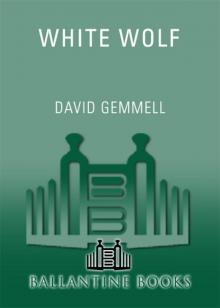 White Wolf
White Wolf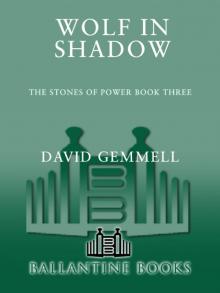 Wolf in Shadow
Wolf in Shadow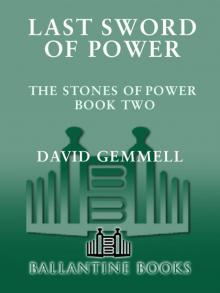 Last Sword of Power
Last Sword of Power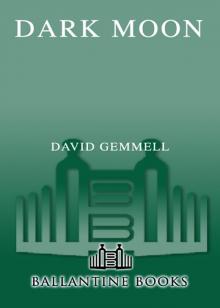 Dark Moon
Dark Moon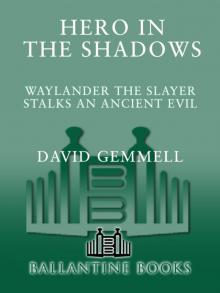 Hero in the Shadows
Hero in the Shadows Gemmell, David - Drenai 09 - Hero In The Shadows
Gemmell, David - Drenai 09 - Hero In The Shadows Waylander
Waylander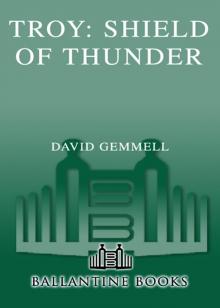 Shield of Thunder
Shield of Thunder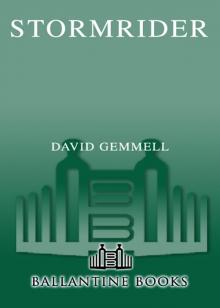 Stormrider Stormrider
Stormrider Stormrider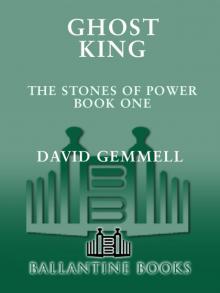 Ghost King
Ghost King Legend
Legend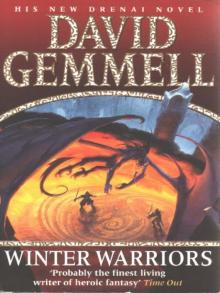 Winter Warriors
Winter Warriors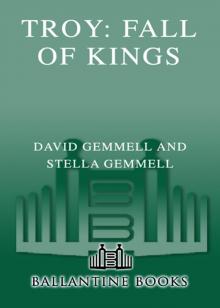 Fall of Kings
Fall of Kings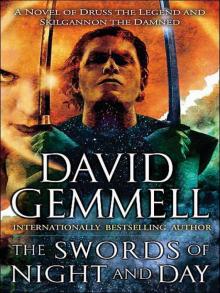 The Swords of Night and Day
The Swords of Night and Day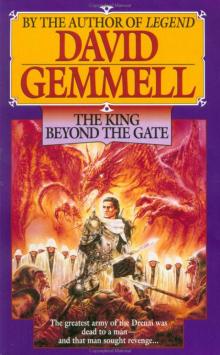 The King Beyond the Gate
The King Beyond the Gate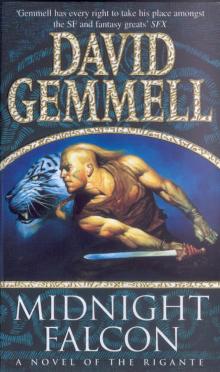 Midnight Falcon
Midnight Falcon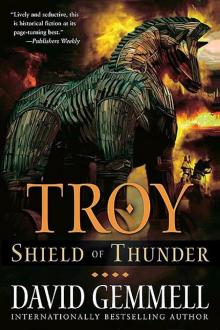 02 - Shield of Thunder
02 - Shield of Thunder In the Realm of the Wolf
In the Realm of the Wolf Ravenheart
Ravenheart The First Chronicles of Druss the Legend
The First Chronicles of Druss the Legend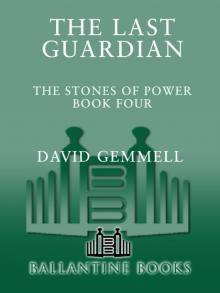 Last Guardian
Last Guardian Stormrider
Stormrider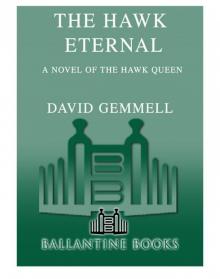 The Hawk Eternal
The Hawk Eternal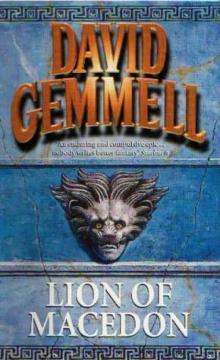 Lion of Macedon
Lion of Macedon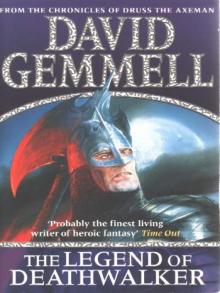 The Legend of Deathwalker
The Legend of Deathwalker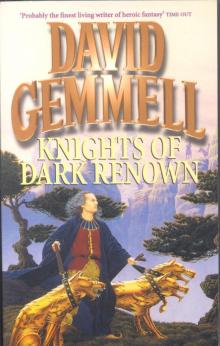 Knights of Dark Renown
Knights of Dark Renown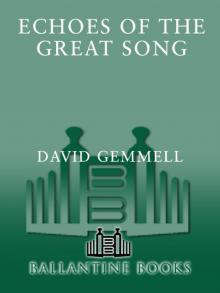 Echoes of the Great Song
Echoes of the Great Song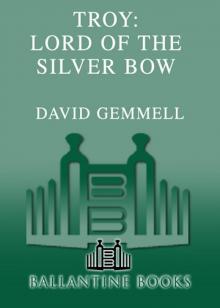 Lord of the Silver Bow
Lord of the Silver Bow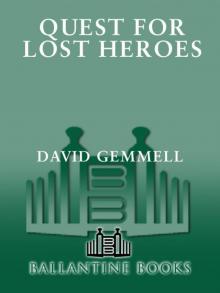 Quest for Lost Heroes
Quest for Lost Heroes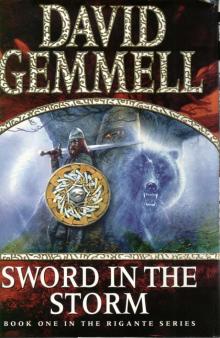 Sword in the Storm
Sword in the Storm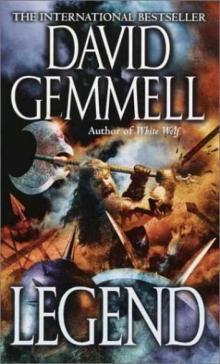 Drenai Saga 01 - Legend
Drenai Saga 01 - Legend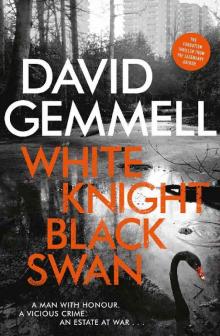 White Knight/Black Swan
White Knight/Black Swan![[Troy 02] - Shield of Thunder Read online](http://i1.bookreadfree.com/i/03/19/troy_02_-_shield_of_thunder_preview.jpg) [Troy 02] - Shield of Thunder
[Troy 02] - Shield of Thunder Lord of the Silver Bow t-1
Lord of the Silver Bow t-1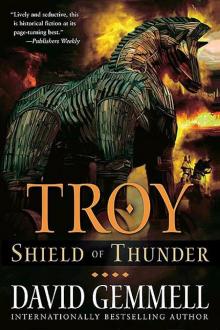 Shield of Thunder t-2
Shield of Thunder t-2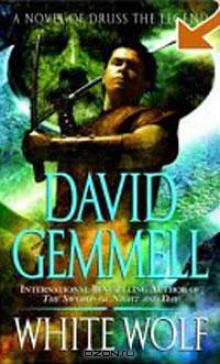 White Wolf: A Novel of Druss the Legend dt-10
White Wolf: A Novel of Druss the Legend dt-10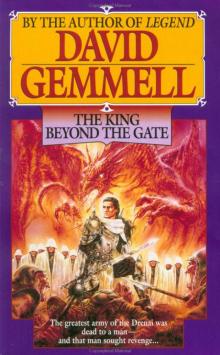 Drenai Saga 02 - The King Beyond the Gate
Drenai Saga 02 - The King Beyond the Gate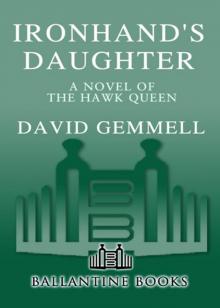 Ironhand's Daughter
Ironhand's Daughter Gemmell, David - Drenai 06 - The First Chronicles of Druss the Legend
Gemmell, David - Drenai 06 - The First Chronicles of Druss the Legend The Last Guardian
The Last Guardian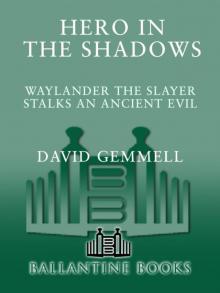 Hero in the Shadows: A Waylander the Slayer Novel
Hero in the Shadows: A Waylander the Slayer Novel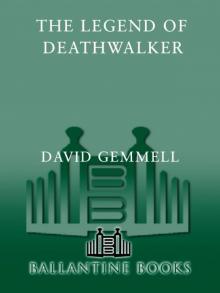 The Legend of the Deathwalker
The Legend of the Deathwalker